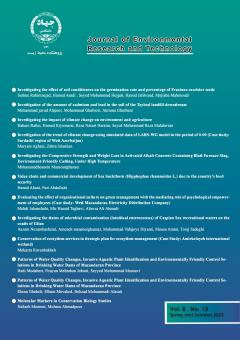Value chain and commercial development of Sea buckthorn (Hipphophae rhamnoides L.) due to the country's food security
Subject Areas : اقتصاد محیط زیستHamid Ahani 1 * , Pari Abdollahi 2
1 - MPORG
2 - Graduated
Keywords: Medicinal value, Hippophae, economics, seaberry,
Abstract :
Prevention of diseases, increase of body immunity and health and health attitude, along with income generation, which is one of the economic goals of every country, can be realized with the development of medicinal plants. The bitter elder species with the scientific name Hipphophae rhamnoides L. and the English name sea buckthorn is native to Iran and has many values that have been introduced in this research. The economy of resistance, which is one of the general policies of the system, will happen with the production of multi-purpose plants due to the climatic and social political crises. The development of economic species with the participation of communities along with the green space fulfills the production of medicine and food.It can include a bank for the development of gardens outside the city or domestic and foreign investors. According to the permission of the Ministry of Jihad and Agriculture, as well as the approval of the Science and Technology Park, part of the people have become familiar with the properties of this beautiful and economic medicinal plant in our country, but this plant is still not known to the public. By planting this species as a multi-purpose species, it is also possible to generate income with the products of this plant such as leaves and fruits. This species tolerates temperatures up to minus forty degrees. The purpose of this research is to introduce the properties and effective ingredients of this plant to be a guide for decision makers and investors.
آهنی، ح، جلیلوند، ح، واعظی ج، ساداتی ا، 1396، تأثیر تنش خشکی روی ریختشناسی نهال سنجدتلخ (Elaeagnus rhamnoides (L.) A. Nelson)، حفاظت زیست بوم گیاهان، 11(5) :191-204.
جوانشیر، ک، 1355. اطلس گیاهان چوبی ایران انجمن ملی حفاظت منابع طبیعی و محیط انسانی، 163 صفحه.
آهنی، ح.، کریم پور ف.، پیکر ا.، 1399. گیاه دارویی و حیرت انگیز خولان، انتشارات اساتید دانشگاه. 184 صفحه.
حسینی س، قراچورلو م.، غیاثی طرزی ب.، قوامی م.، 1393. مروری بر روش های تعین ظرفیت آنتی اکسیدانی اساس واکنش ،روش کار،نقاط قوت و ضعف. علوم غذایی و تغذیه (4)89:11-111.
عبداللهی پ.، آهنی ح، 1401. سنجد تلخ از منظر صنایع غذایی و دارویی، ششمین همایش بین المللی مطالعات میان رشته ای در صنایع غذایی و علوم تغذیه ایران
Ahani,H,Shahidi,E.,Yosefi moghaddam,E., 2021, Plantation of Seabuckthorn Economical Plant in Waterway Mitting.online margin is the important role in technical system of water erosion decreasing.online 1(2):,1-11. Chuangyun Way. Menglin Li. Hang Zhang . Lijuan Zhao. Zhixin Mu.Meixia Wang.Jianhua Zhang.Yan Deny.Li Zhae, 2020, Comparison of Metabolites in Juice Seed and Peel of Seabuckthorn (H r L.subsp.Journal of Plant Biochemistry and Biotechnology, 29(20):305-313 Christaki, E. 2012, Hippophae rhamnoides L.(seabuckthorn :a potential source of nutraceutical .Food and Public Health.2(3).69-72. Couploa,F.&s coppens,Y. 2009 , Le regal vegetal :plantes sauvages comestibles.Paris Sang de la Terre Damian , C.,Leahu,A.,Orogian ,M.,Avramiuc,M.,Carpiuc,N. 2013.Antioxdidant activity in Extractoin of Seabuckthorn.Lucrari Stintififice-Seria Zootehnie.60,151-154. Edraki,M.,Akbarzadeh,A.,Hosseinzadeh m.,Tanideh ,N., SAlehi ,A., Koohi-Hossein abedi.,O, 2014. Healing effect of seabuckthorn ,olive oil and their mixture on full-thickness burn wounds.world.plast.surgury.27(7),317-23. Fraga, C.G.2005.Relevence,essentiality and toxicity of trace elements in human health.Molecular Aspects of Medicine 26:235-244. Gina M. 2011, P &M technologies innovations in pleat science and technology .Ideas, Technologies and Resources for small Business in Non-Timber forest products & services. Guo XF., Yang B., Cai W, and Li D., 2017. Effect of sea buckthorn (Hippophae rhamnoides L.) on blood lipid profiles: A systematic review and meta-analysis from 11 independent randomized controlled trials. Trends in Food Science and Technology. 61:1-10. Jaroszewska A., 2016. The Nutritional Value of Selected Berry Species Wroletta Biel. Janceva S,Andersonne A,Lauberte L,Bikovens O,Nikolajeva V,Jashina L,Zaharova N ,Telysheva G,Senkovs M,Rieksts G,Krasilnikova J, 2022, Sea buckthorn (Hippophae rhamnoides) Waste Biomass after Harvesting as a source of Valuable Biologically active Compounds with Nutraceutical and Antibacterial Potential, 11(5), 642. Karaviedde , L. et al. 2008,Traditional Herbal Medicine:a guide to their safer use. London: Hammersmith Khan A., Manna K., Chinchubose., Das DK., Sinha M., Kesh SB, and et al., 2014. Seabuckthron (Hippophae rhamnoides L.) leaf extract ameliorates the gamma radiation mediated DNA damage and hepatic alterations. Indian journal of experimental biology. 52(10):952-64. Khajuria P., Raghuwanshi P., Rastogi A., Koul A.L., Zargar R., Kour S. (2018). Hepatoprotective effect of seabuckthorn leaf extract in streptozotocin induced diabetes mellitus in Wistar rats. Indian Journal of Animal Research. 52(12): 1745-1750. Pavlovic,N.,ValekLeodic,Mi Skulin,Mislava C,Joki c,S.2016.Supercritical co2 Extraction of Seabuckthorn Suryakumar G , Gupta A, 2011: Medicinal and Therapentic Potential of Seabuckhorn (Hippophae rhmnoides L.) Journal of Ethnopharmacology, 138268-27 Singh S., Sharma P.C. , 2022. Gas chromatography–mass spectrometry (GC–MS) profiling reveals substantial metabolome diversity in seabuckthorn (Hippophae rhamnoides L.) berries originating from different geographical regions in the Indian Himalayas, 33(2): 214-225. Wang Ch., Lei, M., Zhang H, Zhao L., 2020. Journal of Plant Biochemistry and Biotechnology 29, 305–313 Zadernowski R.,Nowak- Polakowsk H,Lossow,B., Nesterowicz,J.,1997. Seabuckthorn lipids.J.food lipids.https://doi.org/10.1111/j.1745-4522.1997.tb00090.x Zeb A., 2004, Important Therapeutic uses of Sea Buckthorn (Hippophae):A Review .Journal of Biologial Sciences 4(5):681-693. Zeb,A (2006) Anticrircinogenic potential of lipids from Hippophae evidence from the recent literature.Asian Pacific Journal of cancer preventation,1,32-35

